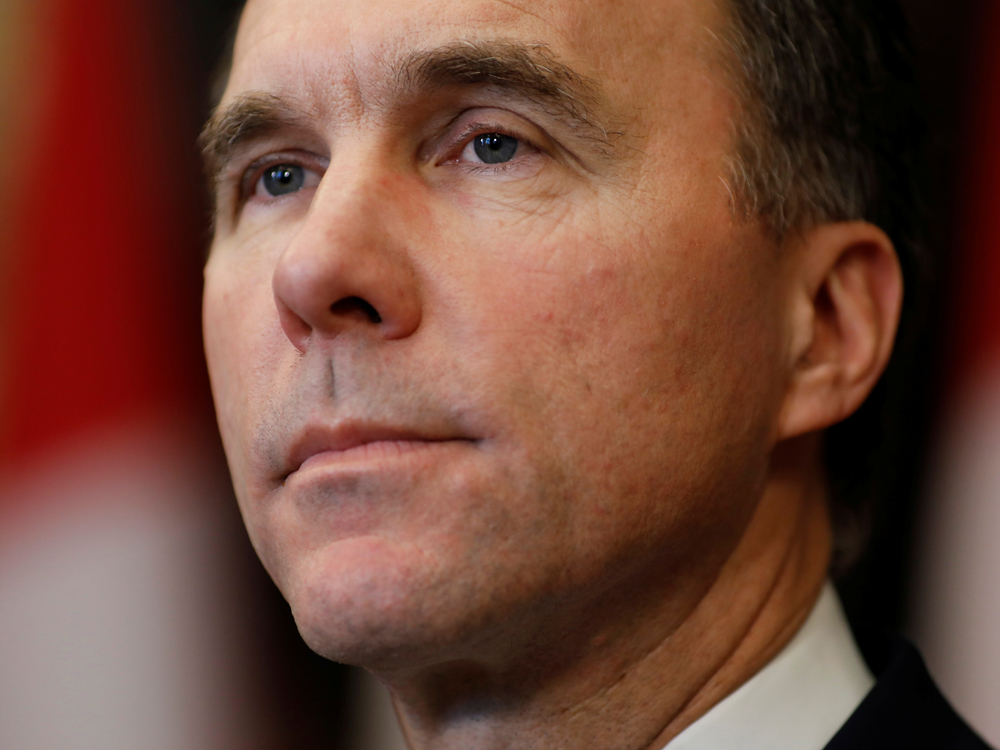Finance Minister Bill Morneau says that the federal government will announce “support” for Canadians who have to be quarantined from COVID-19 as early as next week as part of a broader response plan to the virus, which has so far infected 46 Canadians and caused major disruptions to the markets, commodity prices and travel and tourism sectors.
“It is clear that COVID-19 is going to have an impact on the Canadian economy … but the impact will depend on the depth and length of the virus,” Morneau told the audience at a Canadian Club event in Toronto.
“We are continuing to monitor the impact on businesses and workers. We have the tools to respond really quickly,” he added.
He provided little detail on what the “support” to Canadians who have to be quarantined might look like, but promised specifics next week.
Morneau said the government also plans to increase the risk adjustment provision in the upcoming federal budget to ensure that it has a sufficient contingency fund that can be deployed if necessary.
The risk adjustment provision in last year’s budget was approximately $3 billion.
Morneau said that the impact of COVID-19 is materializing through four main channels — commodity prices, travel and tourism, global supply chains and business and consumer sentiment.
The government’s response to the virus will look specifically at the impact on these four channels, he said.
“We are seeing lower prices of oil impacting oil companies. We know the tourism and travel sector is being impacted because people are changing their travel plans. But until we see the depth and duration of this virus, we don’t know yet what other sectors will be impacted,” Morneau said.
Earlier this week, the Bank of Canada slashed interest rates by half a per cent in a move to inject monetary easing into the economy.
North American markets have lost roughly 10 per cent of their value over the last two weeks, placing them firmly in correction territory.
Morneau hinted that monetary policy was just the first step in a potentially longer-term plan to address the economic fallout from the virus and that the government will not hesitate to exercise its fiscal might to address “potential virus-related issues down the road.”
“Monetary policy will address issues around market sentiment and individual consumer confidence in a way that the Bank sees is appropriate. We will be looking at fiscal measures that are going to be complementary,” Morneau told reporters in a media scrum after his speech.
In response to a question on whether the government would consider measures taken by other countries like Italy and Japan in closing schools and limiting public gatherings, Morneau said the government would only take measures “as appropriate.”
“The situation is different in Italy and Japan. We are in touch with the international community, and continue to learn from what they are doing. But we will consider measures that are more Canadian-appropriate,” he said.
The first community spread case of COVID-19 hit Canada Friday morning, a sign the virus could be morphing into a pandemic. A woman in B.C. tested positive despite having no contact with anyone known to be carrying the virus. Until Friday, all of the coronavirus cases in Canada could be linked back to people returning from regions hit hard by the virus.
The federal government formed a cabinet committee earlier this week, led by Deputy Prime Minister Chrystia Freeland and Health Minister Patty Hadju to craft a response to COVID-19, as the number of cases continued to climb in Canada. The committee is focused on making “quick decisions” in the event of a surge in the number of cases.
Meanwhile, investors continued to dump stocks and clamber into safe-haven assets. The Dow Jones Industrial Average plummeted by almost 800 points within an hour of morning trading.
The Toronto Stock Exchange too dropped over 400 points, or roughly 2.5 per cent despite news that the Canadian economy added 30,000 new jobs in February.
Financial Post
• Email: vsubramaniam@nationalpost.com | Twitter: VanmalaS

